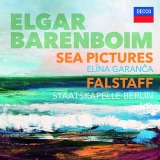 Edward Elgar: Sea Pictures op. 37 + Falstaff op. 86; Elina Garanca, Staatskapelle Berlin, Daniel Barenboim; 1 CD Decca 4850968; Aufnahme 2019, Veröffentlichung 24/07/2020 (59') - Rezension von Remy Franck
Edward Elgar: Sea Pictures op. 37 + Falstaff op. 86; Elina Garanca, Staatskapelle Berlin, Daniel Barenboim; 1 CD Decca 4850968; Aufnahme 2019, Veröffentlichung 24/07/2020 (59') - Rezension von Remy Franck
Daniel Barenboims Einspielung von Elgars Sea Pictures hat zwei Niveaus. Das eine, grandios und packend, entspricht dem Spiel der Staatskapelle Berlin, das zweite eher unausgeglichen, dem Gesang von Elina Garanca.
In der oft tiefen Lage der fünf Lieder wird Garancas Stimme breit, und es fehlt ihr an schlankem Raffinement. In den höheren Lagen wirkt sie freier und passender. Die meisten Sängerinnen versteht man nicht gut in diesen Liedern, nicht einmal Janet Baker, deren Aufnahme mit Barbirolli immer noch die Referenzeinspielung dieser Komposition ist. Garancas Stimme ist leider nicht wendig und nicht unmittelbar spontan genug. In den weit ausschwingenden Gesangslinien kann sie zwar überzeugen, aber allzu oft ist ihr Gesang einfach zu gedämpft.
Auf der anderen Seite haben wir das ungemein suggestive Dirigieren von Daniel Barenboim und das wunderbar differenzierte Spiel der Staatskapelle. Der Orchesterpart klingt dunkel und dramatisch, immer mit einem Gefühl von mysteriöser Tiefe, die ein Meer eben auszeichnet.
Exzellent ist auch die Interpretation von Elgars Falstaff, die ebenfalls in Konkurrenz zu Barbirollis überragender Einspielung steht. Doch Barenboim ist einer der besten Elgar-Dirigenten unserer Zeit, und es gelingt ihm, diese komplexe Partituren perfekt zu formen und all das spontan und dramatisch-deskriptiv hörbar werden zu lassen, was Elgar in der Musik ausdrückt.
Daniel Barenboim’s recording of Elgars Sea Pictures has two levels. One, grandiose and gripping, corresponds to the playing of the Staatskapelle Berlin, the second rather unbalanced, to the singing of Elina Garanca.
In the often low register of the five songs, Garanca’s voice becomes broad and lacks slender refinement. In the higher registers her singing is freer and more appropriate. With most singers the text is not well understood in these songs, not even in Janet Baker’s recording with Barbirolli which is still the reference recording of this composition. Garanca’s voice is unfortunately not agile and not immediately spontaneous enough. In the wide vocal lines she can convince, but all too often her singing is simply too subdued.
On the other hand, we have the incredibly suggestive conducting of Daniel Barenboim and the wonderfully differentiated playing of the Staatskapelle. The orchestral part is dark and dramatic, always with a feeling of mysterious depth that is characteristic of a sea.
The interpretation of Elgar’s Falstaff is also excellent, even compared to Barbirolli’s outstanding recording. But Barenboim is one of the finest Elgar conductors of our time, and he succeeds in shaping these complex score to perfection in one spontaneous, dramatic and descriptive performance.
























